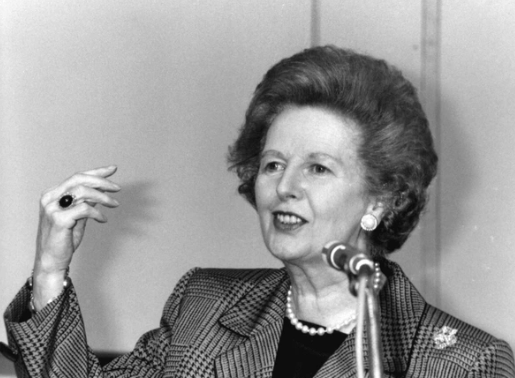Introduction: A Historic Victory in British Politics
On May 4, 1979, Margaret Thatcher became the first woman to hold the office of Prime Minister of the United Kingdom. Her election marked a turning point in British history, not only because she broke the gender barrier in the highest political office but also because she ushered in a new era of conservative politics that would come to be known as “Thatcherism.” Thatcher’s policies, leadership style, and impact on both Britain and the world would define the political landscape for more than a decade, making her one of the most influential and controversial figures in modern British history.
Thatcher’s rise to power came at a time of great economic and social upheaval in Britain. The 1970s had been a decade of economic stagnation, high inflation, and rising unemployment, culminating in the infamous “Winter of Discontent” of 1978-79, when widespread strikes paralyzed the country. The Labour government, led by Prime Minister James Callaghan, was seen as ineffective in addressing these crises, and the electorate was ready for change. Thatcher’s message of economic liberalism, personal responsibility, and a strong state resonated with voters, leading to a decisive Conservative victory.
Read Also : General Strike of 1926: Britain’s Most Significant Industrial Conflict
The Road to 1979: Margaret Thatcher’s Rise in British Politics
Margaret Thatcher’s path to becoming Prime Minister was marked by determination, resilience, and a clear vision for Britain’s future.
Early Political Career: From Grantham to the House of Commons
Margaret Thatcher was born Margaret Roberts on October 13, 1925, in Grantham, Lincolnshire. She was the daughter of a grocer and Methodist lay preacher, Alfred Roberts, who instilled in her a strong work ethic, a belief in self-reliance, and conservative values. These formative influences would shape her political philosophy and leadership style throughout her career.
Thatcher studied chemistry at Somerville College, Oxford, before becoming a research chemist and later a barrister. Her interest in politics was sparked at a young age, and in 1959, she was elected as the Member of Parliament (MP) for Finchley, a seat she would hold until her retirement from politics in 1992. Thatcher quickly made a name for herself in the Conservative Party, known for her strong convictions and no-nonsense approach.
In 1970, Thatcher was appointed Secretary of State for Education and Science under Prime Minister Edward Heath. During her tenure, she became known as “Margaret Thatcher, Milk Snatcher” for her controversial decision to end free milk for schoolchildren, a move that made her a divisive figure but also demonstrated her willingness to make tough decisions.
The Leadership Challenge: Becoming the Conservative Party Leader
Margaret Thatcher’s ascent to the leadership of the Conservative Party was not without challenges. The Conservative Party had suffered a series of electoral defeats in the 1970s, and by 1975, it was in disarray. Many within the party believed that a change in leadership was necessary to restore the party’s fortunes.
In February 1975, Thatcher challenged Edward Heath for the leadership of the Conservative Party. Her decision to run was initially seen as unlikely to succeed, as she was relatively inexperienced compared to other potential candidates. However, Thatcher’s campaign focused on the need for a new direction for the party, emphasizing free-market economics, reducing the power of trade unions, and restoring Britain’s position as a global power.
Thatcher’s message resonated with the party’s MPs, and she won the leadership election, becoming the first woman to lead a major British political party. Her victory was a significant milestone in British politics and set the stage for her eventual rise to the premiership.
The 1979 General Election: A Nation Ready for Change
The general election of 1979 was held against a backdrop of economic crisis, social unrest, and a loss of confidence in the Labour government. The “Winter of Discontent,” which saw widespread strikes by public sector workers over pay disputes, had severely damaged the government’s credibility. Inflation was high, unemployment was rising, and the British economy was in a state of stagnation.
Margaret Thatcher campaigned on a platform of economic reform, promising to reduce inflation, cut taxes, and curb the power of the trade unions. Her message of individual responsibility, free-market economics, and a strong, authoritative government appealed to a public that was weary of the economic and social turmoil of the 1970s. The Conservative Party’s slogan, “Labour Isn’t Working,” effectively captured the mood of the electorate and capitalized on the discontent with the Labour government.
On May 3, 1979, the Conservatives won a decisive victory, securing 339 seats in the House of Commons to Labour’s 269. Thatcher’s triumph was seen as a rejection of the post-war consensus that had dominated British politics since 1945 and the beginning of a new era of conservative governance.
The Challenges Ahead: Thatcher’s Early Years as Prime Minister
Upon taking office, Margaret Thatcher faced a series of daunting challenges that would test her leadership and define her legacy.
Economic Reforms: Tackling Inflation and Reviving the Economy
One of Thatcher’s first priorities as Prime Minister was to tackle the rampant inflation that had plagued the British economy for much of the 1970s. She believed that inflation was the root cause of the country’s economic woes and that controlling it was essential for restoring economic stability. To achieve this, Thatcher implemented a series of monetarist policies, inspired by the economic theories of Milton Friedman.
Thatcher’s government focused on controlling the money supply, reducing public spending, and raising interest rates to curb inflation. These policies were controversial and led to significant economic pain in the short term. Unemployment rose sharply, reaching over 3 million by the early 1980s, and many traditional industries, such as coal mining and steel, faced closures and job losses.
Despite the social and economic turmoil, Thatcher remained steadfast in her commitment to her economic policies. She famously declared that “the lady’s not for turning,” signaling her refusal to back down in the face of opposition. Over time, her policies began to bear fruit, as inflation was brought under control and the economy began to recover, laying the foundation for the economic growth of the 1980s.
The Battle with the Trade Unions: A Defining Conflict
The struggle between Margaret Thatcher’s government and the trade unions was one of the defining conflicts of her time in office. The trade unions had been a powerful force in British politics for decades, and they had played a central role in the industrial unrest of the 1970s. Thatcher believed that the unions had too much power and that their influence was a major obstacle to economic reform.
Thatcher’s government introduced a series of measures to reduce the power of the trade unions, including laws that restricted their ability to strike, required unions to hold ballots before calling a strike, and limited secondary picketing. These measures were met with fierce resistance from the unions, leading to a series of bitter industrial disputes.
The most significant of these disputes was the miners’ strike of 1984-85, led by the National Union of Mineworkers (NUM) and its leader, Arthur Scargill. The strike, which lasted for over a year, was a brutal and divisive conflict that pitted the government against the miners in a battle over the future of Britain’s coal industry. Thatcher refused to compromise, and the strike ultimately ended in defeat for the NUM, marking a turning point in British industrial relations and solidifying Thatcher’s reputation as a strong and determined leader.
Foreign Policy and the Falklands War: Thatcher’s International Stance
Margaret Thatcher’s foreign policy was characterized by a strong commitment to British sovereignty and a close alliance with the United States, particularly with President Ronald Reagan. Thatcher was a staunch opponent of the Soviet Union and supported the NATO alliance as a bulwark against communism. Her foreign policy was guided by a belief in the importance of national security and the need to defend Britain’s interests on the global stage.
One of the most significant events of Thatcher’s early years in office was the Falklands War of 1982. The conflict began when Argentina invaded the British-controlled Falkland Islands in the South Atlantic. Thatcher’s response was swift and decisive; she dispatched a naval task force to retake the islands, and after a short but intense conflict, British forces successfully liberated the Falklands.
The victory in the Falklands War was a defining moment for Thatcher’s premiership. It boosted her popularity at home, reinforced her image as a strong leader, and demonstrated Britain’s ability to defend its interests overseas. The war also had a lasting impact on British foreign policy, reaffirming the country’s commitment to maintaining its territorial sovereignty and its status as a global power.
The Legacy of Thatcherism: A Lasting Impact on Britain
Margaret Thatcher’s time as Prime Minister left an indelible mark on British society, politics, and the economy. Her policies, often referred to as “Thatcherism,” transformed the country in ways that continue to be felt today.
Economic Liberalism and Privatization: Reshaping the British Economy
One of the most significant aspects of Thatcher’s legacy was her commitment to economic liberalism and the free market. Thatcher believed that the state had become too involved in the economy and that this had stifled innovation, efficiency, and individual enterprise. To address this, her government embarked on a sweeping program of privatization, selling off state-owned industries and utilities to the private sector.
Key industries that were privatized during Thatcher’s time in office included British Telecom, British Gas, British Airways, and British Steel. The privatization program was highly controversial, with critics arguing that it led to job losses, reduced public services, and increased inequality. However, supporters of privatization argued that it improved efficiency, reduced government debt, and stimulated economic growth.
Thatcher’s economic policies also included deregulation, tax cuts, and efforts to reduce the power of the welfare state. These policies were intended to create a more dynamic and competitive economy, and they had a profound impact on the structure of British society. The rise of homeownership, the growth of the financial sector, and the decline of traditional industries were all key features of the Thatcher era.
Social Change and the Welfare State: A Divisive Legacy
Margaret Thatcher policies and leadership style were deeply polarizing, and her impact on British society was both transformative and contentious. Her government’s emphasis on individual responsibility, self-reliance, and free-market economics challenged the post-war consensus that had dominated British politics since the 1940s.
Thatcher’s reforms to the welfare state, including reductions in benefits and the introduction of market mechanisms into public services, were seen by some as necessary measures to reduce government spending and promote efficiency. However, others viewed these reforms as an attack on the social safety net and a contributing factor to growing inequality and social division.
Thatcher’s time in office also saw significant changes in British society, including the rise of consumer culture, the decline of trade union power, and the increasing importance of the financial sector. These changes were accompanied by a shift in social attitudes, with greater emphasis on individualism and personal success.
While Thatcher’s supporters praised her for revitalizing the British economy and restoring national pride, her critics accused her of creating a more unequal and divided society. The legacy of Thatcherism continues to be a subject of debate, with its impact on British politics and society still keenly felt today.
International Influence and the Special Relationship: Thatcher on the World Stage
Margaret Thatcher influence extended far beyond Britain’s borders. As one of the key figures of the conservative wave that swept through the Western world in the 1980s, Thatcher played a significant role in shaping global politics. Her close relationship with U.S. President Ronald Reagan was central to her foreign policy, and the two leaders shared a common vision of free-market economics, anti-communism, and a strong national defense.
Thatcher’s commitment to the “special relationship” between the United Kingdom and the United States was a cornerstone of her foreign policy. She and Reagan worked closely together on issues such as the Cold War, arms control, and the fight against terrorism. Their partnership was instrumental in the eventual collapse of the Soviet Union and the end of the Cold War.
Thatcher’s influence was also felt in Europe, where she was a vocal critic of the European Economic Community (EEC), the precursor to the European Union (EU). She opposed the idea of further European integration and was wary of ceding British sovereignty to Brussels. Her stance on Europe would later influence the debate over Britain’s role in the EU and the eventual Brexit referendum in 2016.
Conclusion: The Enduring Legacy of Margaret Thatcher’s Premiership
Margaret Thatcher election as Prime Minister in 1979 marked the beginning of a new era in British politics. Her policies, leadership style, and impact on both Britain and the world continue to be felt today. Thatcherism, with its emphasis on free-market economics, individual responsibility, and a strong state, transformed the British economy and reshaped the country’s social and political landscape.
Thatcher’s legacy is one of both achievement and controversy. She is credited with revitalizing the British economy, curbing the power of the trade unions, and restoring Britain’s status as a global power. However, her policies also led to deep social divisions, increased inequality, and the decline of traditional industries. The debate over her legacy continues, with some viewing her as a champion of economic freedom and others as a divisive figure who left a fractured society in her wake.
Margaret Thatcher time as Prime Minister was a defining period in British history. Her leadership set the stage for the political and economic changes that would shape the late 20th and early 21st centuries. Whether celebrated or criticized, her impact on Britain and the world is undeniable, and her legacy remains a powerful and enduring force in British politics.
FAQ About Margaret Thatcher Becoming Prime Minister (1979)
What led to Margaret Thatcher’s election as Prime Minister in 1979?
Margaret Thatcher was elected as Prime Minister in 1979 due to widespread dissatisfaction with the Labour government’s handling of the economy and the “Winter of Discontent.” Her campaign focused on economic reform, reducing the power of trade unions, and restoring Britain’s global standing.
How did Margaret Thatcher’s government tackle inflation?
Thatcher’s government implemented monetarist policies, including controlling the money supply, reducing public spending, and raising interest rates. These measures were aimed at curbing inflation, which had plagued the British economy in the 1970s. While these policies led to short-term economic pain, including high unemployment, they eventually brought inflation under control.
What was the significance of the Falklands War during Thatcher’s premiership?
The Falklands War in 1982 was a key event in Thatcher’s premiership, as it demonstrated her determination to defend British sovereignty. The successful retaking of the Falkland Islands from Argentina boosted Thatcher’s popularity at home and reinforced her image as a strong and decisive leader.
How did Margaret Thatcher’s policies impact the British economy?
Thatcher’s policies, often referred to as Thatcherism, had a profound impact on the British economy. Her government’s focus on privatization, deregulation, and reducing the power of trade unions reshaped the economy, leading to economic growth but also increasing inequality and social division.
What is the legacy of Margaret Thatcher’s time as Prime Minister?
Margaret Thatcher’s legacy is complex and multifaceted. She is credited with transforming the British economy, curbing the power of trade unions, and restoring Britain’s global standing. However, her policies also led to deep social divisions and increased inequality. The debate over her legacy continues, with her impact on British politics and society still keenly felt today.







1 comment